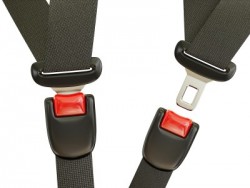Half of all States require all adults in a vehicle to wear safety belts and in all States children must be in restraints. Not too long ago Indiana also expanded its safety belt law to cover rear-seat occupants. 
Indiana has an active Statute that requires motor vehicle occupants to wear seatbelts. The statute states the following:
Each occupant of a motor vehicle equipped with a safety belt that: (1) meets the standards stated in the Federal Motor Vehicle Safety Standard Number 208 (49 CFR 571.208); and (2) is standard equipment installed by the manufacturer; shall have a safety belt properly fastened about the occupant’s body at all times when the vehicle is in forward motion.
Ind. Code Ann. § 9-19-10-2 (West). Another portion of Statute, IC 9-19-10-7, expressly forbids evidence of the failure to wear a seatbelt for the purpose of demonstrating fault or for the purpose of showing failure to mitigate the person’s damage. It should be noted that Indiana case law has excluded several vehicles from this statute. “The term ‘vehicle,’ as used in the seat belt enforcement statute … is a ‘passenger motor vehicle,’ and does not include trucks, tractors, and recreational vehicles, but does include sport utility vehicles (SUVs). State v. Price, App.2000, 724 N.E.2d 670.
In the 1999 case of Hopper v. Carey, 716 N.E.2d 566 (1999), the Indiana Court of Appeals carefully analyzed the seatbelt defense in the State of Indiana. That case involved the driver of a fire truck and his son brought against another motorist and a company which had paved the road. The company wished to bring in evidence that the driver and his son were not wearing seatbelts. The Court held: (1) [a] seatbelt defense is not admissible to demonstrate fault under the common law defense of contributory negligence or the Comparative Fault Act, and (2) defense of incurred risk [by the driver] is likewise unavailable unless the defendant has actual knowledge of a specific risk, which means more than a general awareness that a future accident is possible. Hopper v. Carey, 716 N.E.2d 566 (Ind. Ct. App. 1999). One unique situation came in in the case of Burge v. Teter. That court held that evidence that motorist’s children were not restrained in a child restraint system at time of accident could not be used to prove contributory fault and therefore, could not be used to mitigate damages. Burge v. Teter, 808 N.E.2d 124 (Ind. Ct. App. 2004). On the other hand, the Indiana Supreme Court spoke to the issue of not wearing a seatbelt as “misuse of a vehicle” in the products liability case of Morgen v. Ford Motor Co. The court claimed that “When a manufacturer does not reasonably expect it, a plaintiff’s failure to use available safety devices can constitute misuse in a crashworthiness case.” Morgen v. Ford Motor Co., 797 N.E.2d 1146, 1149 (Ind. 2003). Therefore not wearing a seatbelt can be brought up under certain specific circumstances.




